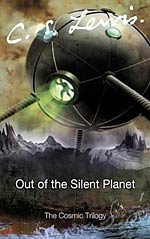
![]() Sable Aradia
Sable Aradia
12/24/2015
![]()
I have found that in looking at descriptions of this book, it is often "dismissed" as "theology." I think that does this book a grave disservice. Certainly there are theological themes; it is well known that Lewis was a devout Christian, wrote about it, and his fiction also often focused on Christian themes. But one never hears his classic Chronicles of Narnia being *classified* as "theology," although of course the main tale is the retelling of Biblical themes in many ways. No one hears that about Lord of the Rings as written by his friend J.R.R. Tolkien either; though literary critics point it out. And in the realm of science fiction, while literary critics, again, do not miss the references, no one *classifies* Ender's Game or Dune as "theology." Perhaps this has something to do with the rest of the trilogy, which I have not read, but taken alone I don't understand this.
Out of the Silent Planet is among the most awesome science fiction books I think I've ever had the pleasure to read, and I think the only reason it's not considered a classic in the field is because of the bias of "pure reason." Keep in mind that this book was written in 1938, so one cannot expect that it should conform to modern science in the wake of the Space Age. But its science is actually spot on when founded in scientific theories that were, as yet, untested at the time of this book's writing; much like Frankenstein and War of the Worlds.
The protagonist, a professor of languages named Ransom, finds himself kidnapped in a misadventure to be taken to Mars (called by a different name by its inhabitants) to be offered to those inhabitants as a sacrifice. It turns out that this is not what the inhabitants want him for and a fantastic adventure ensues. I expect that why it's often interpreted as "theology" is because Lewis uses the Christian mythology as a framework for an extraterrestrial cosmology that involves beings that might possibly be described as "extra-dimensional". That this extra-dimensional understanding involves godlike beings who are the "lords" of the worlds they inhabit, and that this is fairly consistent as an extraterrestrial interpretation of Christian cosmology, is almost incidental; the moral cautionary tale, however, is not. But if you're going to not consider a book seriously because there's a moral cautionary tale hidden in it, you might as well give up on the genre.
Lewis' Martians are among the most interesting aliens I've ever had the pleasure to read about. The cultures he created, and the difficulties in a human trying to understand, and be understood by, an alien culture, is the stuff that we geeks read this genre for. Ransom spends a great deal of time among the Martian cultures and learns their ways and their language (remember that he is a professor of languages) and he develops a close friendship with one member of the three sentient races that inhabit Mars, while in the meantime he is pursued by the two men who brought him to the planet in the first place; one of whom views himself as a man of intelligence and reason who wants to ensure the immortality of humanity -- at all costs, including that of the sentient species who inhabit Mars and any others that might exist -- and the other of which is interested solely in money. Unlike many other books in which the "peaceful primitives" are overwhelmed by the warlike humans that invade them, thus requiring defense by a violent action-hero protagonist, the Martians find the humans incomprehensible and ultimately silly. This does not make them any less a danger to Ransom, however.
Lewis' vast alien Martian landscape, as imagined by a man who had only seen a blurry pink image with dark blotches and ice caps on it through a telescope at that point, was an absolute delight. And solar radiation was more potent outside of the Earth's atmosphere, gravity was minimal and artificially created and air was limited in the spaceship, and Mars was cold, had lesser gravity, and thin oxygen at its higher elevations. Lewis's low gravity Martian landscape was truly fantastic, more like the crazy surface of comets as we are currently familiar with them. I was taken by its beauty and the scope of its imagination.
In short, read it. It was amazing.